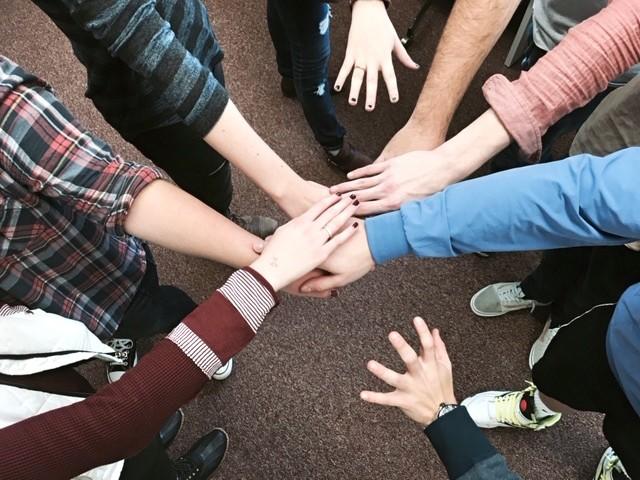Hazing Is Hazardous
“It was just a very embarrassing night for me, and really made me question the whole fraternity deal.” When asked why he continued to pledge, however, he sighed and said, “I knew what I was getting myself into, and I knew the end result would be worth it.”
So close, yet so far away
WHAT IS HAZING?
Hazing occurs when a person is forced to complete tasks or rituals, that are often difficult and or humiliating, in order to gain acceptance or admittance into a specific group, whether it be a fraternity or sorority, team or club. Hazing comes in many different forms, including verbal, sexual, physical and online. In today’s world of competitive sports, social groups, and college life, athletes or students often have to compete for the spot that they so desperately yearn for. What does it take to be accepted? From gorging on as much food as possible to performing humiliating tasks (sexual, dangerous, and/or illegal), those candidates who are hopeful to gain admittance to a so-called elite group are at the mercy of the organization’s existing members. Recent reports of hazing have been unbelievable and outrageous, yet sadly they are still common. According to Babson College, 47% of students come to college having experienced hazing, and 40% of students once at college, are aware of hazing activities.
HAZING HISTORY
Hazing has been around since the time of Plato in 387 B.C. Otherwise known as pennalism, it tended to be somewhat of an impractical joke. One thing about hazing hasn’t changed, however, its goal. Its goal is to humiliate and embarrass a person in order to make him or her feel inferior to another person or group of people. However, the stereotypical fraternity hazing started as recently as the nineteenth and twentieth centuries, when fraternities were being created. The first hazing related death occurred in 1873. There were, however, previous deaths that were deemed to be caused by “horseplay” that could possibly be attributed to hazing if examined under current criteria. After the Vietnam War, alcohol related hazing occurrences began to rise.
The question people may be asking is, why? Why do people haze or subject themselves to hazing? According to a study conducted by Georgetown University, people haze because it gives them a sense of pride and maintains tradition. It also seems to enforce bonding among members of a group and filter out the people that aren’t committed enough. However, it also has the potential to undermine trust among members, create a loss of friends that aren’t tied to the organization, and physical or emotional pain.
HAZING IN THE NEWS
A prime example of sexual hazing activities is the Sayreville Scandal of 2014. During the 2014 football season at Sayreville High School in Sayreville New Jersey, six football players sexually assaulted their freshmen teammates in the locker room several times. The freshmen boys were sexually penetrated, thrown up against walls, and publicly humiliated. The boys didn’t approach a higher power for weeks, all because they believed it was a normal ritual for new team members. After the allegations were brought to the police, seven Sayreville upperclassmen football players were taken into custody. In an article immediately following the arrests, Matthew Stanmyre and Sue Epstein from NJ.com reported, “according to Prosecutor Andrew Carey, three were charged with aggravated sexual assault, aggravated criminal sexual contact, conspiracy to commit aggravated criminal sexual contact, criminal restraint, and hazing for engaging in an act of sexual penetration upon one of the juvenile victims. Both the perpetrators and the victims lives were painfully changed forever through the acts of hazing.
HAZING EXPERIENCES
In an anonymous interview with four local male college students, two reported that they had been hazed as high school students. Both men were hazed in their freshmen year of high school as new members of their football teams. According to their reports, they were constantly shoved around in the locker room, mocked in school, and were publicly humiliated multiple times. The hazing events even reached a point when their close friends were affected too. One student explained, “one time the older guys on the team messaged a girl I liked telling her I was ‘gay and had STD’s’.”When asked why he allowed the hazing to continue, he explained, “to feel accepted, because if I hadn’t I would feel like an outcast and my older team members would not respect or like me. I was afraid if I didn’t participate, they [older teammates] would ruin my high school experience.” The second student recounted a story about a teammate that did not agree to being hazed. According to our source, the uncooperative teammate “was immediately hated by the older players. It was pretty sad, but it’s even sadder that doing the right thing in this case was worse than being hazed.” When asked if they ever thought to report the activity, both boys agreed that if the events had gotten bad enough, they would have both reported the activity. They also agreed, however, that they were “too afraid” to report the incidents and would have rather gotten bullied for a few months rather than being known as the “rat who told on the captains.”
When asked if hazing is stoppable, instantaneously, all four of the young men being interviewed replied no. They expressed similar explanations regarding this question, including the fact that people will always want to have authority. “There will always be guys who feel they need to gain a sense of respect from their younger peers, and unfortunately that means that being a jerk will satisfy them,” one said.
While these situations portray the acts of hazing through humiliation and physical stress, other types of hazing occur today in colleges across the nation. The main one being alcoholic challenges to break someone down and test their “skills” to see if they’re capable of being part of an organization. Fraternities and sororities are specifically known for their acts of hazing. During a period before being welcomed into the chapter of either a fraternity or sorority called ‘pledge’, individuals are purposely pushed to their physical and mental limits as a test to see if they can fit in. Most events during their pledge time include binge drinking and performing embarrassing tasks.
In an anonymous interview with two members of a fraternity at a local university, frightening truths about alcohol hazing were revealed. Both young men are a part of the same fraternity, and went through the pledging stages in the fall of 2013. They began pledge in September, and were initiated the week before Christmas break in December. Twice every week, pledging activities took place behind the locked doors of their fraternities home.
One of the two men recalled, “I never knew how intense pledging would be. I thought it would be a few crazy nights every once and awhile, and possibly puking sometimes. It turned out to be much more intense than I expected.” He described his worst experience in detail: “It was the first night of being a pledge, and they made us (the pledges) drink a mixture of alcohol, spit, and god knows what else. It was so disgusting. They got us all so drunk and made us keep drinking even after we would get sick. It was just a very embarrassing night for me, and really made me question the whole fraternity deal.” When asked why he continued to pledge, however, he sighed and said, “I knew what I was getting myself into, and I knew the end result would be worth it.”
WILL HAZING EVER STOP?
In order to stop hazing incidents from occurring, large consequences must be set along with more anonymous outlets for hazing victims. If more people felt comfortable about telling authorities of hazing incidents, more action against the perpetrators could be taken, therefore deterring incidents from happening again.
So how can hazing be demolished? There simply need to be consequences for the perpetrator, NOT for the victim. If there were greater punishments for hazing actions, there would be a lower chance for hazing situations to occur. For example, the Sayreville Scandal has pushed people to be better. There have been no reports of hazing in their school and neighboring schools since. When hazing is proven to be wrong and punishments are given, fewer situations will occur.
MADISON HIGH SCHOOL HAZING POLICIES
In an interview with Madison High School’s Assistant Principal, John Connolly, MDO asked a few questions about hazing at Madison.
The interview began with comparing hazing to the harassment intimidation bullying law for New Jersey. Mr. Connolly explained that hazing can be considered a “group taking advantage of another group”, with hazing siding with the more “intimidation” part of the HIB law. However, Madison does not see much hazing. Mr. Connolly was unable to recall a huge infraction of hazing in his time here, pointing out that we were lucky for the community-like feel of Madison, where people are more inclusive than exclusive.
On the off chance that a hazing infraction does occur, the Code of Conduct is used as a guideline for punishment. According to Mr. Connolly, each situation is different and the punishment depends on the “severity of the situation”. He then explained that punishment might not be the first step, and that mediation could help resolve a conflict without anyone getting punished.
Mr. Connolly then focused on sports team and who would be at fault if hazing were to occur. He explained that the coaches or advisers need to set the right tone for a group so that hazing does not happen. If it does, the coaches/advisors take responsibility to a certain degree. He emphasized, however, that “students are held accountable.” It is possible, though, that sometimes hazing occurs without the coaches or advisors knowing.
MDO then asked Mr. Connolly how he trains the staff at Madison for dealing with hazing. He described that during the staff meetings early in the year, he has everyone review policies and procedures with him and Ms. Morgenthaler, who is the Anti-Bullying Specialist at Madison. The staff also takes an online training course to help understand and identify HIB. The students are also educated about this type of behavior. Mr. Connolly also explained that he reviews the Code of Conduct during the class meetings in the beginning of the year. He explained that overall, even though hazing does not happen often at Madison, the teachers and staff are all well equipped to help.
THE WAY WE SEE IT
Despite some complicated teenagers who head into the fraternity and sorority lifestyles with a full understanding of the hazing experience and allow themselves to be tormented, embarrassed, and put in danger, we at Madison Dodger Online do not approve of any hazing activities. We believe each person should be treated with full respect and should never be pushed to do something he or she does not approve of. There are many other alternatives to hazing. For instance, rather than being publically humiliated, new or hopeful members of organizations can use brain games, safe competitions, and team building exercises to determine if they are capable of being part of a certain group. We at MDO stand against hazing in all forms.
https://ruthsterner.files.wordpress.com/2008/05/histpdf.pdf
https://stophazing.georgetown.edu/why-do-people-haze










